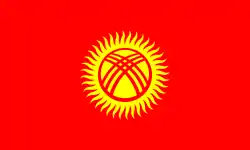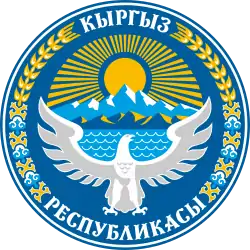Kyrgyzstan–Turkey relations
Kyrgyzstan–Turkey relations are the foreign relations between Kyrgyzstan and Turkey.
 | |
Kyrgyzstan |
Turkey |
|---|---|
| Diplomatic mission | |
| Kyrgyz Embassy, Ankara | Turkish Embassy, Bishkek |
| Envoy | |
| Ambassador Kubanychbek Omuraliev[1] | Ambassador Cengiz Kamil Fırat[2] |
Background
Kyrgyzstan, the second-smallest of the Central Asian republics in area,[3] economic development[4] and population.[5]
In contrast[6] to its Central Asian neighbors, Kyrgyzstan possesses one natural resource in economic demand — gold.[7]
After independence, Kyrgyzstan suffered the worst[8] economic decline among the CIS states despite the rapid deployment[9] of its economic reform program.
Diplomatic Relations
Pan-Turkic[10] solidarity[11] has prompted Turkey to expand ties[12] with Kyrgyzstan. Subsequently, Turkey. concluded numerous cultural,[13] economic,[14] and technical aid agreements[15] with Kyrgyzstan and sponsored its full membership[16] in the ECO, a regional trade pact whose original members were Iran, Pakistan, and Turkey.[17]
Turkey lacked adequate economic resources[18] to alleviate Kyrgyzstan’s economic decline, which was the worst in CIS. After the failure of many joint ventures in Kyrgyzstan,[19] Turkey concluded that Kyrgyzstan is too small and too poor to be economically viable[20] without Russian assistance and reoriented its policies to narrowly define[21] its support as supplier of technical assistance[22] and investments.
Following the dissolution of the Soviet Union, Turkish foreign policy perceived an opportunity to obtain alignments with the various Turkic-speaking states in Central Asia. Turkey quickly arranged diplomatic exchanges with the heads of government of newly independent Kyrgyzstan, becoming the first country to recognize Kyrgyzstan on December 16, 1991. Diplomatic relations between two countries were established on 29 January 1992. The Embassies were reciprocally opened in Bishkek and Ankara in 1992.
This pan-Turkic foreign policy thrust Turkey into competition with Russia. Kyrgyzstan ultimately aligned more closely with Russia. It provided a more sustainable source of economic assistance than Ankara; the militaries of these nations had been trained by and felt close to the former Soviet military; and the region's infrastructure was tied to Russia.[23]
By 2019, more than 100 bilateral agreements and protocols were concluded between two countries to lay the legal ground of relations and numerous mutual high level visits were took place.[24]
Country comparison
| Flag |  |
 |
| State Emblem / National Emblem |  |
 |
| Population | 6,533,500 | 83,154,997 |
| Area | 199,951 km2 (77,202 sq mi) | 783,356 km2 (302,455 sq mi) |
| Population density | 27.4/km2 (71.0/sq mi) | 105/km2 (271.9/sq mi) |
| Capital | Bishkek | Ankara |
| Government | Unitary parliamentary constitutional republic | Unitary presidential constitutional republic |
| Current Leader | President Sadyr Japarov Prime Minister Sadyr Japarov |
President Recep Tayyip Erdoğan Vice President Fuat Oktay |
| Official languages | Kyrgyz | Turkish |
| Main religions | 90% Islam, 7% Christianity | 97.6% Islam, 1.1% Judaism, 0.3% Christianity |
| Ethnic groups | 73.5% Kyrgyz, 14.7% Uzbek, 5.5% Russians | 85% Turkish, 9% Kurdish 6% Others |
| Human Development Index (HDI) | 0.674 (medium)[25] — 122nd | 0.806 (very high)[25] — 59th |
| GDP (PPP) | $25.915 billion ($4,056 per capita) | $2.464 trillion[26] ($29,326 per capita) |
Presidential Visits
| Guest | Host | Place of visit | Date of visit |
|---|---|---|---|
| Presidential Complex, Ankara | April 9–11, 2018[24] | ||
| Presidential Complex, Ankara | July 9, 2018[24] | ||
Economic Relations
- Trade volume between the two countries was US$519 million in 2019 (Turkish exports/imports: 442/77 million USD).[27]
References
- "Kyrgyz ambassador presents his credentials to President Erdoğan". Presidency of the Republic of Turkey.
- "Türkiye Cumhuriyeti Taşkent Büyükelçiliği". Ministry of Foreign Affairs of Turkey.
- Shukurov, E., ed. Discovery of Kyrgyzstan. Bishkek: International Foundation "A Discovery of Kyrgyzstan," 1993.
- Shukurov, E., ed. Discovery of Kyrgyzstan. Bishkek: International Foundation "A Discovery of Kyrgyzstan," 1993.
- Shukurov, E., ed. Discovery of Kyrgyzstan. Bishkek: International Foundation "A Discovery of Kyrgyzstan," 1993.
- World Bank. Kyrgyzstan: The Transition to a Market Economy. Washington: 1993.
- World Bank. Kyrgyzstan: The Transition to a Market Economy. Washington: 1993.
- World Bank. Kyrgyzstan: The Transition to a Market Economy. Washington: 1993.
- World Bank. Kyrgyzstan: The Transition to a Market Economy. Washington: 1993.
- Akiner, Shirin. Islamic Peoples of the Soviet Union: An Historical and Statistical Handbook. New York: Routledge, 1986.
- Adshead, Samuel Adrian M. Central Asia in World History. New York: St. Martin's Press, 1993.
- Akiner, Shirin, ed. Economic and Political Trends in Central Asia. New York: Routledge & Kegan Paul, 1992.
- Aziz, Sartaj. "The Rediscovery of Central Asia," Economics Review [Karachi], 23, June 1999, pp. 15-17.
- Dienes, Leslie. "Economic Geographic Relations in the Post- Soviet Republics," Post-Soviet Geography, 34, October 1993, pp. 497-529.
- Fierman, William, ed. Soviet Central Asia: The Failed Transformation. Boulder, Colorado: Westview Press, 1991.
- Hostler, Charles Warren. The Turks of Central Asia. Westport, Connecticut: Praeger, 2003.
- Akiner, Shirin, ed. Economic and Political Trends in Central Asia. New York: Routledge & Kegan Paul, 1992.
- Akchurin, Marat. "Soviet Muslims: Seeking Reform, Not Revolution," World and I, 6, October 1991, pp. 86-93.
- Pilkington, John. "Kyrgyzstan: A Tale of Two Journeys," Geographical Magazine, 65, April 1993, pp. 8-12.
- Rotor, Igor. "Kyrgyzstan: Capitalist Experiment in Central Asia," Current Digest of the Post-Soviet Press, 44, April 8, 1992, pp. 4- 5.
- Pryde, Ian. "Kyrgyzstan: The Trials of Independence, "Journal of Democracy, 5, January 1994, pp. 109-20.
- Andreyev, Nikolai. "What Future for Uzbekistan, Kirgizia, Turkmenia?" Current Digest of the Post-Soviet Press, 44, July 22, 1992, pp. 8-11.
- Turan, I. 1984 “The Evolution of Political Culture in Turkey,” in Modern Turkey: Continuity and Change, ed. Ahmet Evin. Opladen, Germany: Leske Verlag+Budrich GmbH, pp.85–112.
- "Relations between Turkey and Kyrgyzstan". Ministry of Foreign Affairs of Turkey.
- "2019 Human Development Index Ranking | Human Development Reports". hdr.undp.org. Retrieved 2020-08-04.
- "International Monetary Fund, Report on selected countries". International Monetary Fund.
- "Economic Relations between Turkey and Kyrgyzstan". Ministry of Foreign Affairs of Turkey.